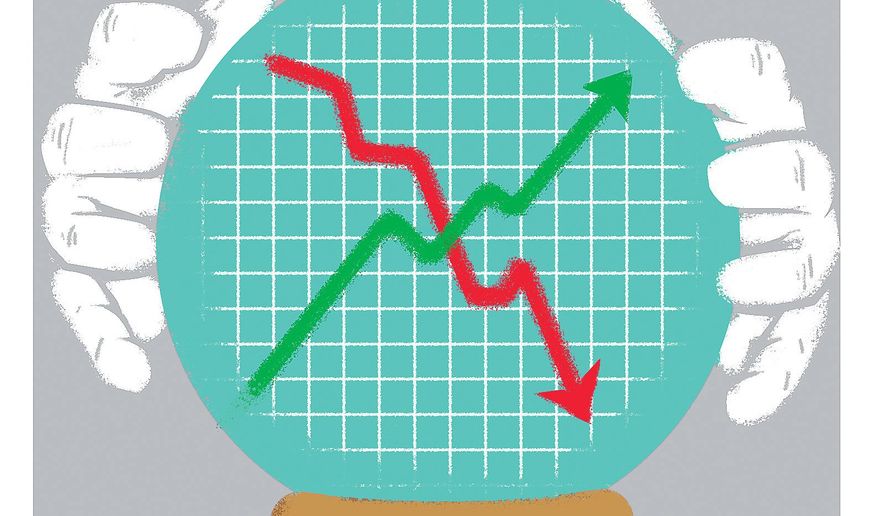OPINION:
President Trump’s second year in office isn’t going so well on a number of strategic fronts.
The increasingly volatile stock market plunged to new lows this week. Economic growth was stuck in a dismal 2 percent range, reminiscent of the Obama years. Polling reports reveal that “an alarming number of Americans are still struggling to get by.”
His handling of major foreign policy issues isn’t anything to write home about, either. One week he was preparing for a “denuclearization” summit with North Korean leader Kim Jong-un, and the next he decided to abruptly call off the meeting, only to change his mind and announce that the summit was on again.
Mr. Trump’s ill-considered decision to slap stiff tariffs on imports from China and a lengthy list of other countries has triggered an all-out trade war against U.S. exports that will hurt numerous businesses and manufacturers here at home, not to mention struggling American consumers.
And his actions on illegal immigrants have taken a cruel and inhumane turn against thousands of migrant children who are now being separated from their parents.
Let’s take some of these one at a time.
The sharp decline in the Dow Jones Industrial Average, which sank 505 points Tuesday before closing down 391 points, was blamed on the political crisis in Italy that could result in its withdrawal from the eurozone.
But the biggest fear this week in many quarters on Wall Street was that the Gross Domestic Product (GDP) had fallen to 2.2 percent at the end of April — from a high of 2.9 percent in last year’s fourth quarter.
By midweek, the Dow was down 1.45 percent after five months of a mostly mediocre performance in the broader market that has, more often than not, turned bearish after last year’s long bull run.
Stocks rebounded Wednesday, but it remains to be seen how the markets will perform for the rest of the year.
But despite the Trump administration’s insistence that the economy has never been better, two reports suggest many Americans are struggling in the Trump economy.
A Federal Reserve survey of 12,200 Americans, and a United Way report found widespread financial hardship in the economy. Among them:
Forty-three percent of households “can’t afford the basics to live, meaning they aren’t earning enough to cover the combined costs of housing, food, child care, health care, transportation and a cellphone, according to the United Way study,” Heather Long writes in The Washington Post.
“Forty percent of American adults don’t have enough savings to cover a $400 emergency expense.”
“More than a quarter of adults skipped medical care last year because they couldn’t afford it.”
“Only 65 percent of African Americans and 66 percent of Hispanics say they are ’doing okay’ financially, vs. 77 percent of whites.”
The newspaper interviewed a veteran food bank worker in Boston who said “she has never seen it like it is today, with so many people with jobs, but still unable to get by.”
Mr. Trump didn’t help the economy last week when he asked the Commerce Department to conduct a new trade review that could result in a 25 percent tariff on imported cars.
The tariffs could apply to Mexico, Canada, Japan and Germany, among other U.S. trading partners, all of whom will slap higher tariffs on U.S. exports in an escalating trade war that neither side can win.
“This widens the trade war tenfold. It’s a major mistake,” said Rufus Yerba, president of the National Foreign Trade Council, one of an army of economists who criticized the president’s proposals for higher tariffs on imports.
“His attempt to reduce the trade deficit with tariffs will lead not only to fewer imports but also to fewer exports, as economists have long understood,” Veronique de Rugy, a senior research fellow at the Mercatus Center at George Mason University, writes in The New York Times.
“Recessions, reduced foreign investment in the United States and a weak dollar are the most effective ways to reduce the trade deficit. I doubt any of us would enjoy these remedies, which result in slower economic growth, less innovation and lower living standards,” she says.
“Maybe that’s why few seem to notice or actually care that the trade deficit has been growing under this president — to its highest level in nearly a decade.”
• Donald Lambro is a syndicated columnist and contributor to The Washington Times.




Please read our comment policy before commenting.